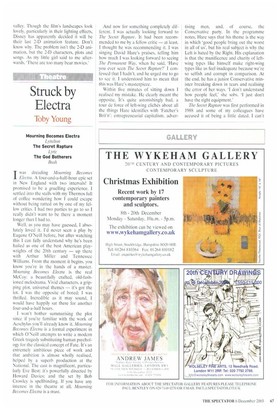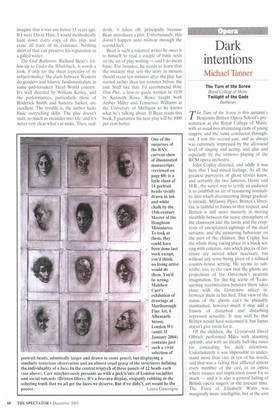Struck by Electra
Toby Young
Mourning Becomes Electra Lyttelton The Secret Rapture Lyric The God Botherers Bush
T was dreading Mourning Becomes 1 Electra. A four-and-a-half-hour epic set in New England with two intervals! It promised to be a gruelling experience. I settled into the stalls with my Thermos full of coffee wondering how I could escape without being ratted on by one of my fellow critics. I had two parties to go to so I really didn't want to be there a moment longer than I had to.
Well, as you may have guessed, I absolutely loved it. I'd never seen a play by Eugene O'Neill before, but after watching this I can fully understand why he's been hailed as one of the best American playwrights of the 20th century — up there with Arthur Miller and Tennessee Williams. From the moment it begins, you know you're in the hands of a master. Mourning Becomes Electra is the real McCoy: a beautifully crafted, old-fashioned melodrama. Vivid characters, a gripping plot, universal themes — it's got 01: lot. I was the opposite of bored: I was thrilled. Incredible as it may sound. I would have happily sat there for another four-and-a-half hours.
I won't bother summarising the plot since if you're familiar with the work of Aeschylus you'll already know it. Mourning Becomes Electra is a formal experiment in which O'Neill attempts to write a modern Greek tragedy substituting human psychology for the classical concept of Fate. It's an extremely ambitious piece of work and that ambition is almost wholly realised, helped by a superb production at the National. The cast is magnificent, particularly Eve Best: it's powerfully directed by Howard Davies; and the set by Bob Crowley is spellbinding. If you have any interest in the theatre at all, Mourning Becomes Electra is a must.
And now for something completely different. I was actually looking forward to The Secret Rapture. It had been recommended to me by a fellow critic — at least, I thought he was recommending it. I was singing David Hare's praises, telling him how much I was looking forward to seeing The Permanent Way, when he said, 'Have you ever seen The Secret Rapture?' I confessed that I hadn't, and he urged me to go to see it. I understood him to mean that this was Hare's masterpiece.
Within five minutes of sitting down I realised my mistake. He clearly meant the opposite. It's quite astonishingly bad, a tour de force of left-wing cliches about all the things Hare identifies with `Fatcher's Brit'n': entrepreneurial capitalism, adver
tising men, and, of course, the Conservative party. In the programme notes, Hare says that his theme is the way in which 'good people bring out the worst in all of us', but his real subject is why the Left is hated by the Right. His explanation is that the munificence and charity of leftwing types like himself make right-wing types like us feel inadequate because we're so selfish and corrupt in comparison. At the end, he has a junior Conservative minister breaking down in tears and realising the error of her ways. 'I don't understand how people feel,' she sobs. 'I just don't have the right equipment.'
The Secret Rapture was first performed in 1988 and some of my colleagues have accused it of being a little dated. I can't imagine that it was any better 15 years ago. If I were David Hare, I would methodically hunt down every copy of this play and erase all trace of its existence. Nothing short of that can preserve his reputation as a gifted writer.
The God Botherers, Richard Bean's follow-up to Under the Whaleback, is worth a look, if only for the sheer topicality of its subject-matter: the clash between Western do-gooders and Islamic fundamentalists in some god-forsaken Third World country. It's well directed by William Kerley, and the performances, particularly those of Roderick Smith and Sunetra Sarker, are excellent. The trouble is, the author lacks basic storytelling skills. The play doesn't start, so much as meander into life, and it's never very clear what's at stake. Then, sud
denly, it takes off, principally because Bean introduces a plot. Unfortunately, this doesn't happen until midway through the second half.
Bean is such a talented writer he owes it to himself to read a couple of basic texts on the art of play-writing — and I do mean basic. For instance, he needs to learn that the incident that sets the story in motion should occur ten minutes after the play has started rather than ten minutes before the end. Stuff like that. I'd recommend Write That Play, a how-to guide written in 1939 by Kenneth Rowe. Rowe taught both Arthur Miller and Tennessee Williams at the University of Michigan so he knows what he's talking about. If Bean reads this book, I guarantee his next play will be 1000 per cent better.



























































































 Previous page
Previous page